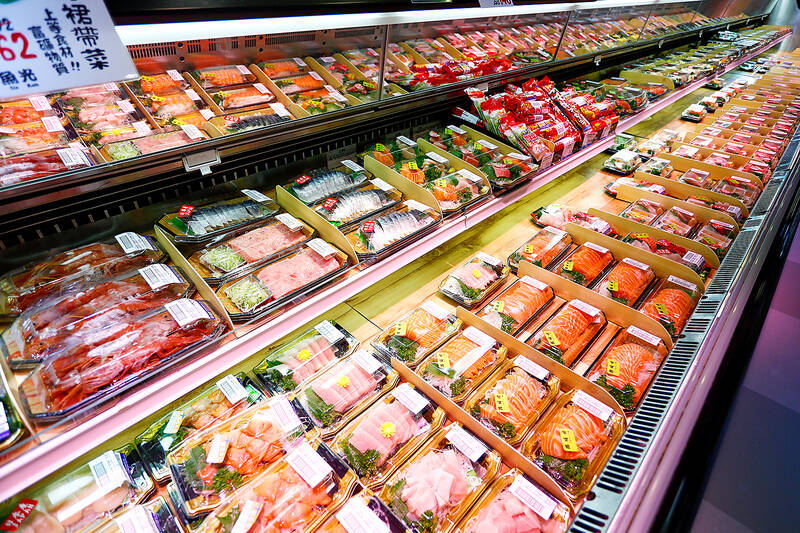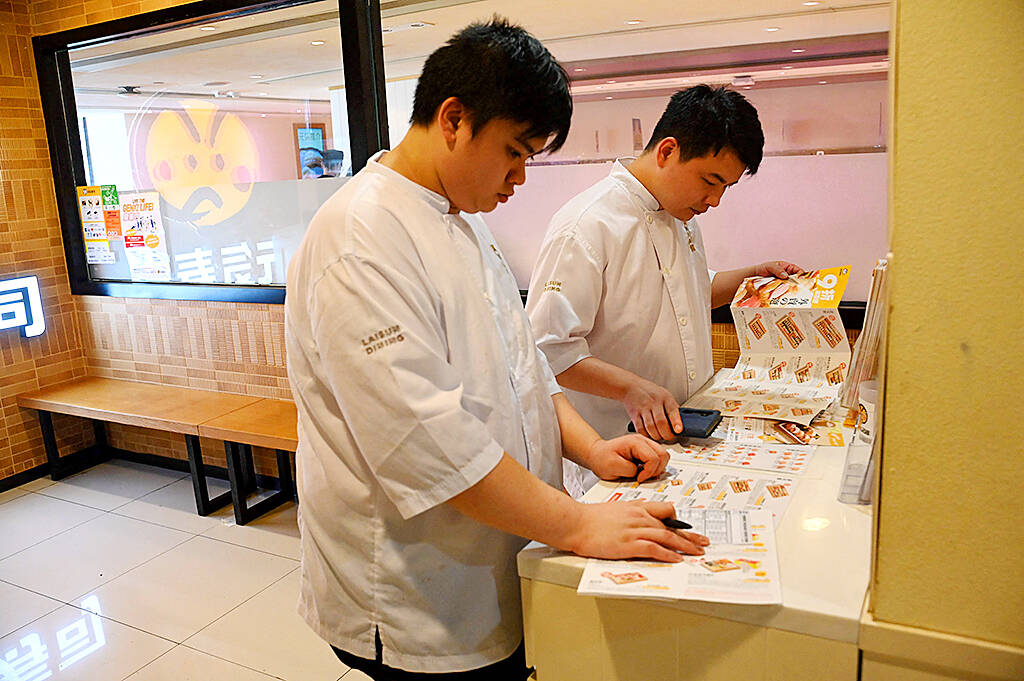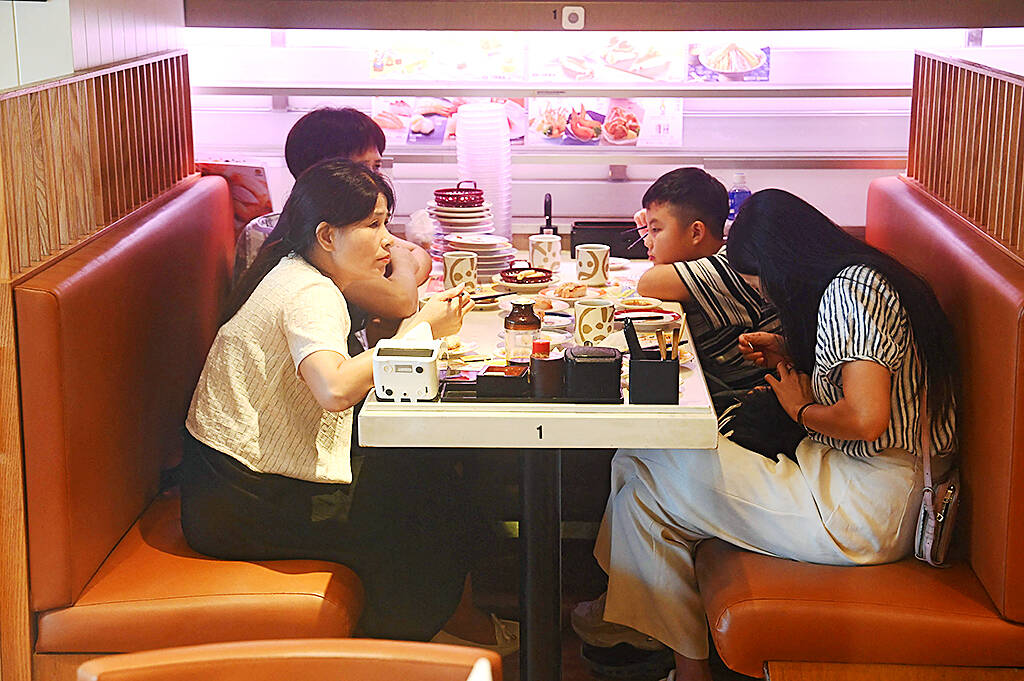At his restaurant in central Beijing, controversy over the release of Fukushima wastewater has left Yao facing a choice: continue stocking his popular Japanese tuna and risk the ire of some consumers or source it from other countries where price and quality could vary.
Chinese sushi and sashimi lovers have expressed reservations after Japan kicked off plans for the disposal of waste from the stricken power plant into the Pacific Ocean, 12 years after one of the world’s worst nuclear disasters.
The intended release has been deemed safe by the International Atomic Energy Agency (IAEA), but China nonetheless banned food imports from 10 Japanese prefectures, with Hong Kong following suit this week.

Photo: EPA-EFE
Restaurants in Beijing and Hong Kong are already reeling from the restrictions. “To tell the truth, we have felt the impact,” said Yao at the entrance of his restaurant.
Hong Kong food caterer Jasy Choi, who runs a small kitchen for takeaway Japanese food, said the ban would cause a business overhaul.
“About 80 percent of the seafood products we use come from Japan,” the 36-year-old chef said. “If more than half of my Japan-imported ingredients are affected, then it would be difficult for me to continue to operate.”

Photo: AFP
China and Hong Kong are the largest importers of Japanese foodstuffs in the world, according to Tokyo’s agriculture ministry, bringing in around 500 billion yen (US$3.44 billion) worth of products from the East Asian country. But the release has some consumers concerned about safety. At a chain restaurant in Beijing, as small plates of sushi and other Japanese dishes glided by on a conveyor belt, mother Liu Dan underlined these fears. “From August 24, I’ll specifically tell my child and husband that we will consciously avoid these seafood products when eating at restaurants and shopping,” she said.
Asked about scientific reports concluding that Japan’s wastewater release plan is safe — including one published in July by the IAEA — Liu expressed doubt.
“I have no way of proving whether or not (such reports) are true. I can just say that judging from the plainest of feelings, this definitely isn’t rational,” she said. “Otherwise why would there be worries about the release?”

Photo: AFP
ROCK AND HARD PLACE
China’s foreign ministry summoned Japan’s ambassador on Tuesday to lodge “solemn representations” against the release.
A nuclear expert, however, said the level of tritium in the Fukushima wastewater was well below WHO drinking water limits.
“Tritium has been released (by nuclear power plants) for decades with no evidential detrimental environmental or health effects,” said Tony Hooker, a nuclear expert from the University of Adelaide.
But many restaurant owners in China said they have already stopped buying Japanese fish.
“Before, essentially all of our seafood products were imported from Japan,” Fang Changsheng said in one of his two restaurants, located in a Beijing district popular for Japanese cuisine and nightlife.
The 40-year-old restaurateur says he now sources seafood from elsewhere, including Chile, Spain and Russia.
“It wasn’t really my decision, but due to this (Fukushima wastewater) issue. Getting products is now more of a pain.”
However, at a small sushi restaurant which seats less than 20 people in Hong Kong’s bustling Wan Chai district, Jacky Wong said many customers likely wouldn’t be put off. “It very much depends on how many Hong Kong customers would avoid having Japanese food... There are always some people who would not mind,” Wong said, adding that he would have to take a few days to see if foot traffic drops post-ban. “We can only take one step at a time.”
And some seafood products traditionally sourced from Japan are proving difficult to replace.
Choi in Hong Kong also said that finding substitutes would be difficult. “And even if there are substitutes — say, sea urchin from China, South Korea or Australia, I may not want to offer those to my customers,” he fretted.
“Of course, it’s not good to release nuclear wastewater into the sea, even if it’s treated,” he added.
“But many places around the world have been doing this. How can you ban them all and what change can we small citizens bring?”

The Democratic Progressive Party (DPP), Chinese Nationalist Party (KMT), and the country’s other political groups dare not offend religious groups, says Chen Lih-ming (陳立民), founder of the Taiwan Anti-Religion Alliance (台灣反宗教者聯盟). “It’s the same in other democracies, of course, but because political struggles in Taiwan are extraordinarily fierce, you’ll see candidates visiting several temples each day ahead of elections. That adds impetus to religion here,” says the retired college lecturer. In Japan’s most recent election, the Liberal Democratic Party lost many votes because of its ties to the Unification Church (“the Moonies”). Chen contrasts the progress made by anti-religion movements in

Taiwan doesn’t have a lot of railways, but its network has plenty of history. The government-owned entity that last year became the Taiwan Railway Corp (TRC) has been operating trains since 1891. During the 1895-1945 period of Japanese rule, the colonial government made huge investments in rail infrastructure. The northern port city of Keelung was connected to Kaohsiung in the south. New lines appeared in Pingtung, Yilan and the Hualien-Taitung region. Railway enthusiasts exploring Taiwan will find plenty to amuse themselves. Taipei will soon gain its second rail-themed museum. Elsewhere there’s a number of endearing branch lines and rolling-stock collections, some

This was not supposed to be an election year. The local media is billing it as the “2025 great recall era” (2025大罷免時代) or the “2025 great recall wave” (2025大罷免潮), with many now just shortening it to “great recall.” As of this writing the number of campaigns that have submitted the requisite one percent of eligible voters signatures in legislative districts is 51 — 35 targeting Chinese Nationalist Party (KMT) caucus lawmakers and 16 targeting Democratic Progressive Party (DPP) lawmakers. The pan-green side has more as they started earlier. Many recall campaigns are billing themselves as “Winter Bluebirds” after the “Bluebird Action”

Feb 24 to March 2 It’s said that the entire nation came to a standstill every time The Scholar Swordsman (雲州大儒俠) appeared on television. Children skipped school, farmers left the fields and workers went home to watch their hero Shih Yen-wen (史艷文) rid the world of evil in the 30-minute daily glove puppetry show. Even those who didn’t speak Hoklo (commonly known as Taiwanese) were hooked. Running from March 2, 1970 until the government banned it in 1974, the show made Shih a household name and breathed new life into the faltering traditional puppetry industry. It wasn’t the first